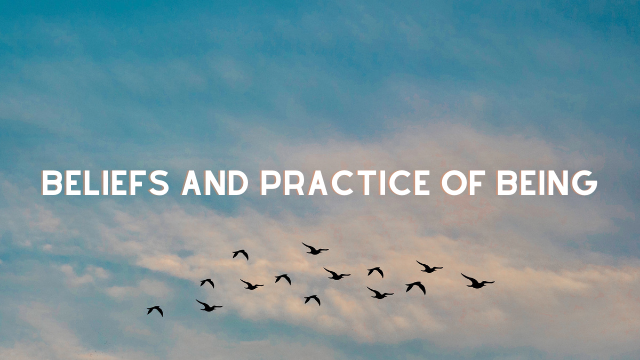
This is part III in a series of four articles on Quaker Traditions. In his role as Associate Secretary for Religious Life, Zachary Dutton has listened deeply to Friends in the community. Working with the PYM staff community engagement team he has provided answers to framing questions for this four-part series. The answers are reflective as opposed to definitive.
We recommend reading Part I: Spiritual Practice, and Part II: Worship, before reading Part III.
What is Faith and Practice?
Quakers traditionally have collected commonly held beliefs, practices, and other agreed upon ways of being with each other in a book of discipline called the Faith and Practice book.
The book is revised every few decades and articulates key aspects of our faith. It details procedures for marriages, memorials, business meetings, membership, assembles a historical narrative of how the faith came to be, and collects inspiring quotes from Friends who have been and still are touchstones to the faith.
A digital version of Faith and Practice is available online.
How does this relate to Discernment, Witness, Ministry and Testimony?
Within a posture of openness, tenderness, and vulnerability, insights emerge that tend to be transformative.
Quakers employ discernment, which is the name for a general process whereby we sift through different spiritual advice and teachings, responding to how we are being moved because of transformational spiritual experiences. Usually discernment is about accessing inner knowledge, guided by others and our own engagement with the divine and often in the context of worship.
Over time, our beliefs and practices change in what Quakers call, “continuing revelation.” Spiritual truth and interpretation of spiritual texts may be revealed in new ways; they are not static.
Quaker discernment has yielded an overarching approach to living in the world while not being of the world. It has given Quakers a sense of wanting to see justice, fairness, equity, and peace for all in society, often acting against the prevailing cultural norms to achieve these aims.
We call these acts “witness.”
The teachings that undergird these acts are often called testimonies or ministry. They amount to a series of beliefs or values, but they have profound and dynamic spiritual underpinnings that are informed by the whole of the tradition. It would be reductionist merely to refer to them as values or beliefs. However, they are sometimes called “Quaker values” especially in more inter-faith contexts, as in Friends Schools, Quaker Colleges, or other organizations that were founded by Quakers but are no longer wholly constituted by Quakers.
What are the SPICES?
It is with some trepidation that we mention “the SPICES” here. But, since the SPICES are still mentioned frequently in the larger Quaker discourse, we should cover them.
SPICES stand for particular testimonies or ministry that have prevailed over the years: simplicity, peace, integrity, community, equity/equality, and stewardship/sustainability. These are felt by some to be reductionist, or Quaker light, and not grounded in deep reflection.
Can you talk about political and external pressures on Friends and the concepts of Resilience, Resistance & Movement?
Quakers have existed at times under acute political pressure from the broader society, and have been pivotal participants in movements for social change.
Quakers have achieved insights through spiritual practice that reveal the unitary nature of all things including humanity, which lead us to act accordingly. We have ancestral resources upon which we sometimes draw to persist with resilience.
We have other resources to draw on to resist, and still others to move society toward ever greater justice, fairness, and peace.
Next week we’ll discuss Ministers, Elders, and paid staff.
The gift of the Quaker faith is that it is one of continuing revelation, so this article speaks to the ‘here and now’ of our faith even as it is tied to, and reflects, our history and tradition. If you have thoughts on these questions, please share them with Zachary Dutton at zdutton@pym.org.
Wednesdays on the Practice of Worship
If you are interested in furthering your own spiritual practice, sign up for the 7:00pm Wednesday Weekly Worship Series . Zachary Dutton will be facilitating a Central Philadelphia Monthly Meeting program that shares a new type of mid-week worship each Wednesday through June.
To receive the Zoom information for Wednesdays on the Practice of Worship (or share your thoughts about the Quaker traditions article) contact Zachary Dutton at zdutton@pym.org.
- Wednesday February 24 at 7 PM, Meg Rose